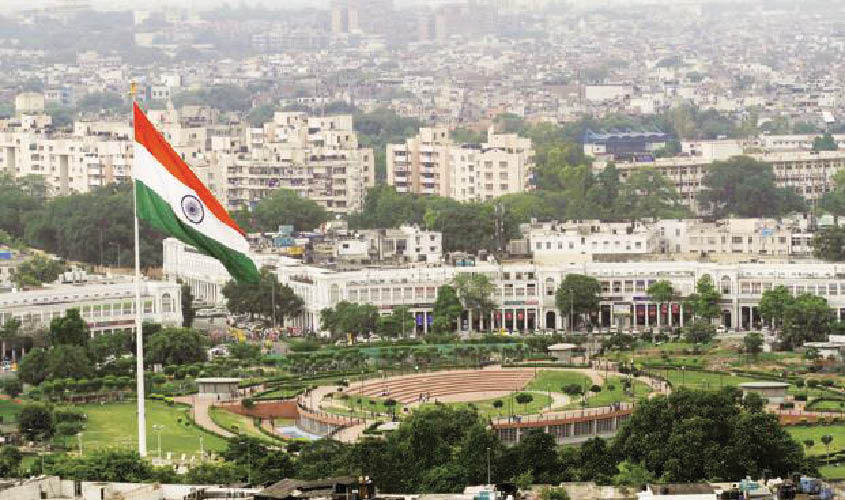Delhi cannot be the monopoly shareholding of those who live in, and around, and try barring those Indians who don’t fall in, and under, territorial jurisdiction thereof.
Indian democracy carries a peculiar feature, that of a seasonal lack of maturity—especially during “election time”—of a few on important national issues, thereby creating a bizarre scenario. The “full statehood for Delhi” slogan is one such case, purportedly for the fulfilment of “election promises”, endorsed years ago by some who might not possibly have visualised the potential pan-India (harmful) consequences.
Let’s clearly understand the issue. After the Constitution of India came into force on 26 January 1950, on 22 December 1953, the then Prime Minister of India stated in Parliament that a Commission would be appointed to examine “objectively and dispassionately” the question of reorganisation of States of the Indian Union. Thereafter, “The States Reorganisation Commission” submitted its report following which vide Constitution (Seventh Amendment Act 1956, effective 01 November 1956) the political map of India was created.
The Commission reported: “The future of Delhi has to be determined by important consideration that it is seat of Union Government. There is every justification for setting up a corporation for a big urban area like Delhi.” The Commission emphatically ruled out any possibility, or demand, to make “seat of the Union Government” a state.
Being a seat of national government, with considerable property belonging to it, location of foreign diplomatic missions and international agencies, there was simply no scope for “diarchy” owing to potential creation of embarrassing situations. “Municipal autonomy in the form of corporation” was recommended as all over the world capitals are under the federal government, and both New Delhi and old Delhi have to be treated as a single unit for administrative purposes.
Indeed, one just needs to see the mind boggling variety and diversity of India today—1.26 billion heads with linguistic composition of: Hindi 41.03%; Bengali 8.11%; Telugu 7.19%; Marathi 6.99%; Tamil 5.91%; Urdu 5.01%; Gujarati 4.48%; Kannada 3.69%; Malayalam 3.21%; Oriya 3.21%; Punjabi 2.83%; Assamese 1.28%; Maithili 1.18%; Bhil/Bhilodi 0.93%; Santhali 0.63%; Kashmiri 0.54%; Nepali 0.28%; Gondi 0.26%; Sindhi 0.25%; Konkani 0.24%; Dogri 0.22%; Khandeshi 0.20%; Tulu 0.17%; Kurukh/Oraon 0.17%; Manipuri 0.14%; Bodo 0.13%; Khasi 0.11%; Mundari 0.10%; Ho 0.10%; Sanskrit 0.0013%; and others 1.41%.
Other than these, according to Encyclopaedia Britannica 2015, there are religious groups (2005) consisting of Hindu 72.04%; Muslim 12.26%; Christian 6.81%; traditional beliefs 3.83%; Sikh 1.87%; Buddhist 0.67%; Jain 0.51%; Bahai 0.17%; Zoroastrian 0.02%; non-religious 1.22%; atheist 0.17%; remainder 0.43%.
Also, vide 8th Schedule, read with Articles 344(1) and 351, as many as 22 languages are recognised: Assamese, Bengali, Bodo, Dogri, Gujarati, Hindi, Kannada, Kashmiri, Konkani, Maithili, Malayalam, Manipuri, Marathi, Nepali, Odiya, Punjabi, Sanskrit, Santhali, Sindhi, Tamil, Telugu, Urdu.
Now, those clamouring for change of Delhi’s status from Union Territory to state may note that all different linguistic, religious and Constitutionally defined 22 linguistic groups referred to, have the right to the capital city of Delhi. They can unrestrictedly move from any place to any state and can have unfettered access to the capital of India. It belongs to them all, notwithstanding the remoteness of their dwellings. Delhi cannot be the monopoly shareholding of those who live in, and around, and try barring all those Indians who don’t fall in, and under, territorial jurisdiction thereof.
Now visualise Delhi as a state within Indian nation state. “Sons of the soil” will be the first priority of the ruling class (irrespective of political party, colour or ideology). Second, “capital reservation and preservation” cannot be far thereafter, to the exclusion of all non-Delhiites. Third, from Chandni Chowk to Chanakyapuri; Qutab Minar to Khari Bauli; Defence Colony to Dhaula Kuan; Vasant Vihar to Vasant Kunj, influential groups will target existing land-use and convert Delhi from three-floor dwellings to a city of skyscrapers, thereby making a metro of enhanced pollution lacking in civic facilities. Fourth, the just-released 2019-2020 Delhi annual budget reveals, as pointed out by rulers of the capital, that the “economy of the Capital is booming when other states are grappling with difficulties”. Here is the crux. The political class of Delhi is in its make-believe world to compare a Union Territory capital city with that of states of India.
Prosperity and booming economics of Delhi are clearly the lure, the magnet for all political parties. One ascends the throne of Delhi, in whatever minuscule form it may be, getting the ethereal feeling of being the “Shah-en-Shah” on “Takht Taus”, with glittering Koh-i-Noor spread across from the mid-riff of cerebrum and cerebellum to one’s forehead—to the delight of the prosperous Delhi ruler and the Durbar, and to the dismay of the “poorly-ruled” subjects of the states. A situation which reminds one of the rule of Alauddin Khilji (1296-1316): “As the capital was fed, the country at large bled.” Is this the ultimate reality for lack of understanding of a few attempting to make the best out of a worst political chaos, to create the capital city of the Indian state a “prosperous state within a union of poor states”? Can it possibly be accepted, or is acceptable to 1.26 billion heads, 99.75% of whom are away from Delhi? Whims certainly cannot play around with the basic features and structure of the Constitution of India. That would be an insult to the visionary makers of the Constitution, which vide Article 1 stipulates “India, that is Bharat, shall be a Union of States”. Delhi is the capital city of “a Union of (29) states” and “07 Union Territories”.
Abhijit Bhattacharyya is an alumnus of National Defence College and an Advocate, Supreme Court, and has recently published China in India. Views are personal.

